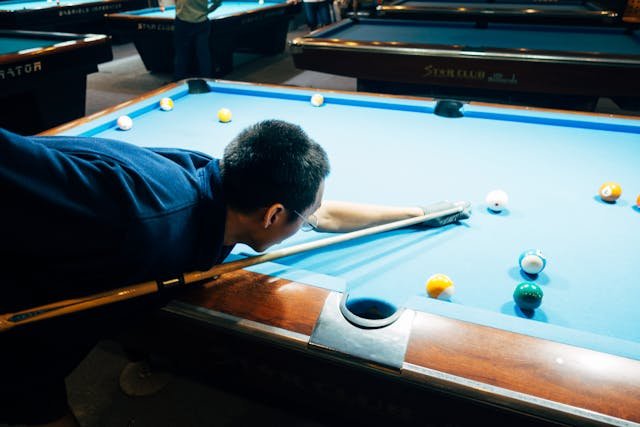Choosing the perfect pool cue can be a game-changer, whether you’re a seasoned pro or just getting started. The right cue enhances accuracy, consistency, and overall enjoyment at the table. Use this guide to navigate the key factors—length, weight, materials, tip, joint, balance, and care—so you can select a cue that truly fits your game.
Understanding the Basics
Before diving into specifics, it helps to know the main parts of a cue and what they do:
- Butt: The thicker end of the cue, often featuring decorative rings or inlays and sometimes a wrap for grip.
- Shaft: The long, tapered section that leads to the tip; its material and taper affect feel and cue ball deflection.
- Tip: The leather piece that contacts the cue ball; its hardness influences spin and control.
- Ferrule: Sits between tip and shaft to absorb impact and protect the shaft.
- Joint: Connects butt and shaft, typically with a threaded pin; construction affects feedback and stability.
Cue Length and Weight
Length: Standard cues are about 58 inches and suit most adult players. Taller players may prefer 59–61 inches. Shorter cues (36–52 inches) help younger players or anyone playing in tight spaces where walls or furniture are nearby.
Weight: Most cues range from 18–21 ounces. Heavier cues (20–21 oz) can help generate power on the break, while lighter cues (18–19 oz) often provide more finesse and cue ball control. If you’re unsure, start around 19 oz and adjust after a few sessions based on feel and consistency.
Material Matters
Shaft Material: Hard rock maple is the classic choice—durable with a smooth, familiar feel. Modern carbon fibre shafts offer excellent consistency and lower deflection, which can make aiming with spin more predictable. To learn more about how low-deflection designs work, see Predator’s overview of low-deflection technology.
Butt Material: Butts are commonly maple, but premium cues may use exotic woods like ebony or cocobolo for aesthetics and balance. The wood, weight bolts, and construction collectively determine how the cue feels through the stroke.
Wrap and Grip Options
Grip affects comfort and control. Common options include:
- Irish Linen: Breathable and traditional, with a light texture.
- Leather: Tacky and cushioned, offering a secure feel.
- No-Wrap: Exposes the wood or a synthetic finish for a sleek, direct connection.
Tip Selection
The tip directly influences spin, touch, and feedback. Tip hardness is the most important factor:
- Soft Tips: Great grip on the cue ball and maximum spin potential; they compress more and need more frequent maintenance.
- Medium Tips: A balanced choice for most players, offering a mix of control, feel, and durability.
- Hard Tips: Durable and crisp, with less maintenance; they tend to deliver less spin but a firmer hit.
For a deeper dive into how hardness affects performance, see Dr. Dave’s resource on cue tip hardness and control. Tip diameter (commonly 12.5–13 mm) can also influence feel and accuracy—slightly smaller tips may aid spin precision, while larger tips can feel more stable for many players.
Joint Types
The joint affects how the cue transmits feedback and how solid the hit feels:
- Wood-to-Wood: A classic, slightly softer feel with strong feedback.
- Stainless Steel: A firmer, more consistent hit and high durability.
- Quick-Release: Speeds up assembly and breakdown—handy for travel and league play.
Custom vs. Standard Cues
Standard cues are widely available and offer excellent performance for most players at a range of price points. Custom cues are built to your specifications—length, weight, balance, materials, inlays, and more—allowing you to fine-tune both performance and aesthetics. They cost more but can be tailored to your exact preferences.
Balancing Act
Balance point—the spot where the cue naturally balances—affects how the cue moves during your stroke. A slightly forward balance can feel powerful and steady through the ball; a more rear-weighted cue can feel nimble and easier to maneuver. There’s no right answer—experiment to see which balance supports your most consistent stroke.
Try Before You Buy
Whenever possible, test several cues. Focus on:
- How the cue feels during warm-up strokes—smoothness, weight distribution, and grip comfort.
- Your accuracy and speed control on common shots (stuns, draws, follow shots).
- How the cue behaves with spin and whether the shaft’s deflection profile suits your aiming style.
League and governing bodies such as the Billiard Congress of America also provide useful standards and resources for players; visit the BCA to learn more.
Maintenance and Care
Good care preserves performance and protects your investment:
- Keep the tip shaped and lightly scuffed to maintain grip on the cue ball.
- Wipe the shaft with a clean, dry cloth after play to remove oils and chalk.
- Store your cue in a protective case and avoid extreme temperatures or humidity.
- Don’t lean your cue against hot surfaces or leave it in a car; warping can occur.
For practical upkeep tips, see this straightforward guide on pool cue maintenance.
Final Thoughts
The perfect pool cue blends personal preference, playing style, and budget. By considering length, weight, materials, wrap, tip hardness, joint type, and balance—and by testing a few options—you’ll find a cue that feels like an extension of your arm. With thoughtful maintenance, it will reward you with precision, control, and confidence for years to come.












